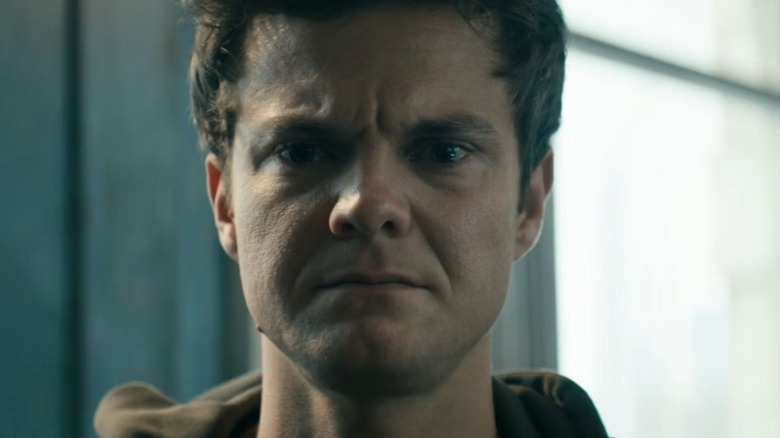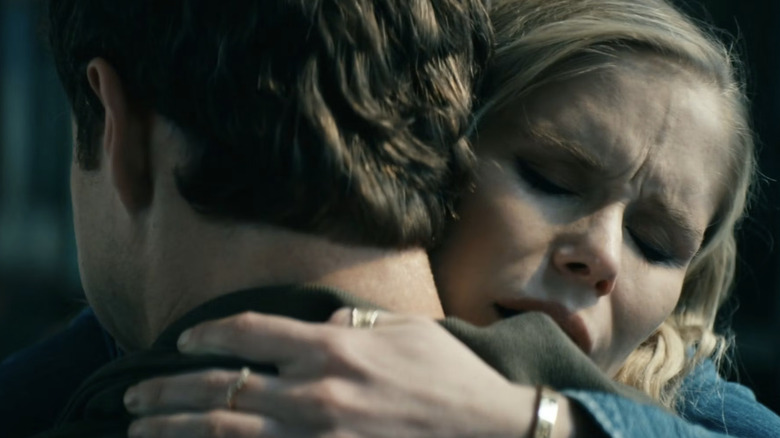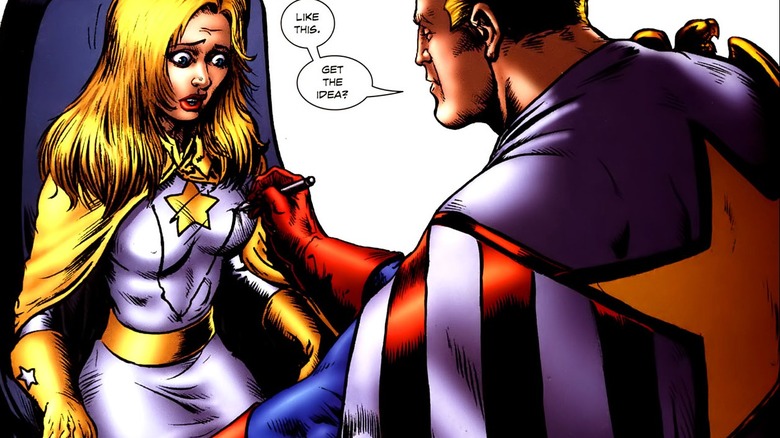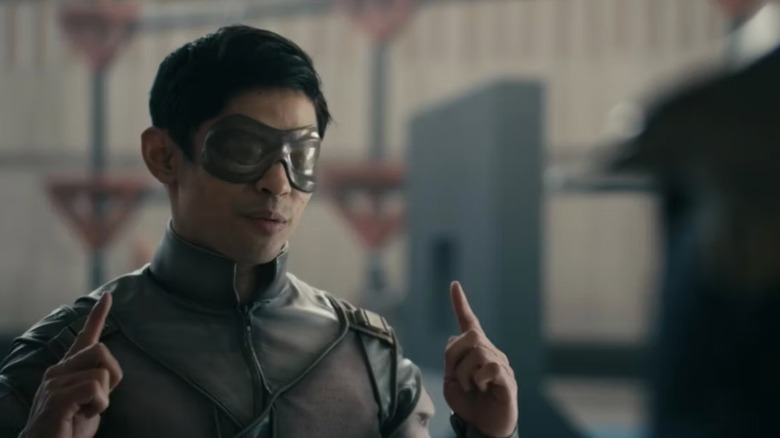The Boys Season 4 Finale Still Thinks Sexual Assault Is Funny
Content warning: This article contains references to sexual assault. Spoilers for "The Boys" season 4 also follow.
"The Boy" season 4 episode 6 "Dirty Business" has proven to be one of the show's most controversial, even for a program that thrives on trampling good taste into the dust. In it, our everyman lead Hughie (Jack Quaid) went undercover to investigate the Batman-esque super detective Tek Knight. Disguised head to toe as the supe Webweaver, Hughie wound up tied down in Tek Knight's sex dungeon and tortured; his captors think it's just kinky fun, but for Hughie, it's actually painful — he tries to opt out but doesn't know what Webweaver's safe word is.
The show seemed to be handling this decently; Hughie broke down and his girlfriend, Annie (Erin Moriarty) offered him a comforting shoulder. Then show creator Eric Kripke spoiled the mood in an interview with Variety. Writer Jennifer Maas echoed most fan reactions to the episode while interviewing Kripke, asking him: "Why bring Hughie into this situation now — kicking him when he's down by having him sexually assaulted by his childhood hero after his dad just died?" Kripke answered: "Well, that's a dark way to look at it! We view it as hilarious."
Both publications and fan forums have taken issue with Kripke's response, viewing it as downplaying the severity of sexual assault and reinforcing the double standards that male victims face. Unfortunately, "The Boys" season 4 finale "Assassination Run" puts Hughie in a similar circumstance that proves this is a pattern of rotten thinking.
A sinister shapeshifter replaces Annie for two weeks, fooling Hughie into having sex with them during that time. This is rape, full-stop, as Hughie's consent was given to "Annie" under false pretenses. Unfortunately, neither Annie nor the episode sees it that way.
Hughie's misfortune on The Boys is part of a nasty pattern
Annie escapes halfway through the episode and defeats the imposter. Once she does, she and Hughie naturally have a conversation about what happened. She views Hughie having sex with the shapeshifter as a violation of her trust (which it was, but Hughie wasn't at fault) and even throws in his face that he liked the fake, always eager Annie more. The issue doesn't linger, because Hughie lists all the things the shapeshifter got wrong about Annie that he noticed, but she still half-seriously tells him he's getting tested for STDs.
Before Hughie and Annie's conversation, MM (Laz Alonso) pats Hughie's shoulder with a look of half pity, half disapproval — the kind men reserve for their friend who's about to be put in the doghouse. Then, when Annie asks Hughie how many times he and the imposter slept together, he answers "had to be less than ... 20," trying and failing to downplay it.
These are all comedy beats. It doesn't even seem to cross the episode's mind, or any of the characters', that Hughie is a victim in this situation too. He didn't cheat on Annie, he was assaulted, yet the burden of reconciliation still falls on his shoulders.
Look, it makes sense that Annie is upset. She was held hostage in awful conditions for 10 days while someone made a mess of her life. If her first priority after all that was to comfort her boyfriend? That'd be too far in the opposite direction. I even think her blaming Hughie is a realistic response; it's not rational, but people often aren't. The problem falls squarely on how the episode frames Annie's reactions as justified and has the others respond in kind.
How The Boys has portrayed assault before
Let's take the heightened genre aspects of this story out, so as to underline the severity. You know the scene in "Revenge of the Nerds" where one of said nerds has sex with a woman by pretending to be her boyfriend? This has been rightfully recognized as a rape scene in years since — because it is. You can't get someone's consent if you're pretending to be someone else. What the shapeshifter did to Hughie is exactly what Lewis (Robert Carradine) did to Betty (Julia Montgomery) in that movie. So, why doesn't the show recognize that?
Kripke understands how common and horrifying the sexual harassment and assault that women face is. He puts his money where his mouth is during "The Boys" season 1, taking care (and consulting with women on his team) to portray the scene (and after-effects) when the Deep assaults Annie. Drawing on the real #MeToo movement, the show made Annie's story into a personally empowering one that still had a satirical edge as Vought International pivots from silencing Annie to rebranding her as a feminist symbol.
Pointedly, the show doesn't depict Starlight or Becca Butcher's (Shantel VanSanten) assaults onscreen; it isn't interested in lingering on the attacks or using them for exploitative storytelling, but rather on how a harsh reality affects the characters. When "The Boys" and sister show "Gen V" feature onscreen sex scenes, they underline consent without cooling down the mood at all.
The political blind spots of The Boys
Unfortunately, the evidence suggests Kripke still has a blind spot — the common belief that sexual assault is a less serious crime when it happens to a man or that men just can't be assaulted the same way women can, whether because men are "stronger" or "too constantly horny" to not enjoy any kind of sex. It's extra disappointing because "The Boys" just satirized this phenomenon earlier this season. Alt-right superheroine Firecracker (Valorie Curry) is publicly revealed to have statutorily raped a 15-year-old boy — but none of her fans cared and she spins the crime in her favor. I don't understand how "The Boys" writers can square this with writing Hughie's assault-by-duplicity the way they did.
This delicate subject is even more difficult to talk about because men's rights activists (MRAs) have hijacked the issue, presenting the stories of male victims in bad faith as a way to undermine feminists. If you try to broach the subject of treating male sexual assault victims with equal care in progressive spaces, you run the risk of looking like a reactionary — which is what the real anti-feminists want.
Now, I don't think men face sexual assault with the same prevalence that women do; the data just doesn't back that up. I honestly think one reason male victims are taken less seriously is because there's less of them than there are women who've faced assault, ergo it looks from the outside like a less pressing problem. While men being assaulted isn't as frequent as women being assaulted, it's an evil act no matter who it's done to. That delineation requires nuance, and for all of the other strengths of "The Boys," nuance isn't one of them.
"The Boys" is streaming on Prime Video.



